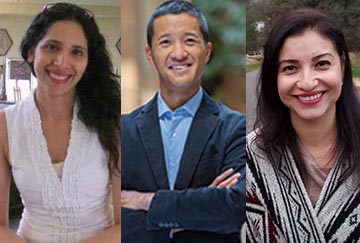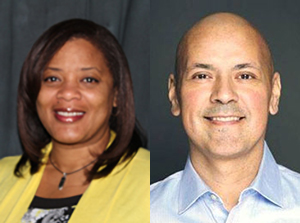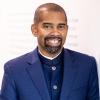Organizational Resilience: An Equity Approach to Crises
How can philanthropy best strengthen organizational resilience? To find out, Alan Kwok spoke with Ana-Marie Jones, who has spent her career transforming organizations with her leadership on readiness, preparedness, and disaster response. Read the Q&A below to learn more about our work internally and with our state-wide membership.
In 2019, Philanthropy California — an alliance of Northern California, Southern California, and San Diego Grantmakers — underwent a statewide planning and training process to enhance our individual and collective capacities to respond to disasters. This approach reflects the increasing frequency and severity of natural hazard events in California, which have disproportionately impacted our most vulnerable communities. Over the past two years, we responded to several wildfires up and down the state and received multiple inquiries about philanthropic responses to disasters from foundations across the country. Our coalition realized that as philanthropy-serving organizations, our role is not only to act as conveners and connectors for our philanthropic members; we also serve as purveyors of evidence-based best practices that promote community resilience centered in equity and justice.
To best serve as a liaison between funders, government agencies, and communities, Philanthropy California sought to achieve two organizational preparedness goals. First, we ensured that every staff member within Philanthropy California understands our organizational responsibilities to our members and the broader philanthropic community when a disaster occurs in our state.
Second, our team could meaningfully contribute to our disaster response efforts by using a new statewide emergency communications platform, drawing upon their personal and professional expertise.
To achieve these two goals, we enlisted disaster preparedness expert Ana-Marie Jones to reframe our thinking and integrate our existing and new organizational tools for every individual in our team. Through our work with Ana-Marie, we realized that the same practices could be helpful to many of our members and the agencies that they support. To best capture her insights and expertise, Alan Kwok, Philanthropy California’s Director of Disaster Resilience, spoke to Ana-Marie about how philanthropy can best strengthen organizational resilience, especially to advance equity and justice in our most vulnerable communities.
AK: Why is it important to build the resilience of organizational operations?
AMJ: Foundations and their grantees play such an important role in our country. In many ways, the philanthropic and nonprofit sector is an extended family structure for civil society, as they provide the necessary services and life-affirming support that families traditionally address. Nonprofit organizations are key to our economic prosperity. And, the nonprofit sector is a significant source of advancement opportunities for women, people of color, and underrepresented communities.
If we truly want equity and justice, and if we want to create a resilient society where all people can survive, thrive, and prosper -- the nonprofit sector and its champions must be thoroughly and sustainably engaged in this conversation. I highly recommend reading CalNonprofit's annual report "Causes Count: The Economic Power of California's Nonprofit Sector" to learn more about these issues.
AK: How does our current approach to disaster resilience impact our most vulnerable communities?
AMJ: The disaster-centric, fear-driven, standard approach to readiness, response, and resilience excludes and alienates our most vulnerable residents. Rather than empowering and harnessing the indigenous wisdom and natural resilience of our diverse communities, the standard approach virtually ensures these communities will continue to fall between the ever-growing cracks in our emergency readiness and response systems. For many of our most vulnerable communities who have little choice but to focus on the immediacy of today, it would be a luxury to worry about an earthquake that "could happen" in the next 30 years. Longterm, volitional, behavior change will never be accomplished using short-term generic threats.
AK: How can we build more resilient organizations in the nonprofit sector?
AMJ: Excellent question! Any funder can help build nonprofit resilience by ensuring nonprofits have access to the unique materials, conversations, and programs they need to embrace real nonprofit readiness and resilience. In the spirit of “do unto others” — if funders engaged in genuine and effective readiness and resilience efforts inside their own organizations, they’d certainly become more savvy, strategic, and nuanced in their funding of nonprofit resilience.
If funders would rescue nonprofit resilience from the drama and politically-constricted disaster framework, we could embrace it as building the capacity of the sector to protect millions of people and billions of dollars of investment. Freed from the constraints of traditional disaster readiness, nonprofit resilience is mission-centric, culturally inclusive, filled with practical skills that help businesses function better, and directly supports staff, consumers, and the greater community. Without the toxic cloud of "disaster" hanging over it, resilience is a brilliant, generative, and energizing conversation.
AK: What would you like to say to our members if they are looking to build organizational resilience as part of their funding areas?
AMJ: I'd say "Awesome! Welcome!" We've long needed funders to make this topic an actionable pursuit for their grantees. I'd show them how some small and easy changes can reap huge rewards. I'd point them to how Philanthropy California went (quite quickly) from barely-touched disaster binders to broad-based buy-in, user-friendly customized tools, and a new understanding of how they can support the resilience and brilliance of their members. I'd share some great nonprofit response and resilience success stories that will leave them stunned by the difference they can make with their grant recipients. Even a few funders aligning behind genuine effective nonprofit resilience can change our future in California.
AK: Finally, what is your superpower?
AMJ: My nickname for the last 30 years has been “Ms. DuctTape.” It stuck because of my weird passion (obsession) and superpower is being able to MacGyver absolutely anything and create solutions.
For further inquiries, you can contact Ana-Marie on LinkedIn.




